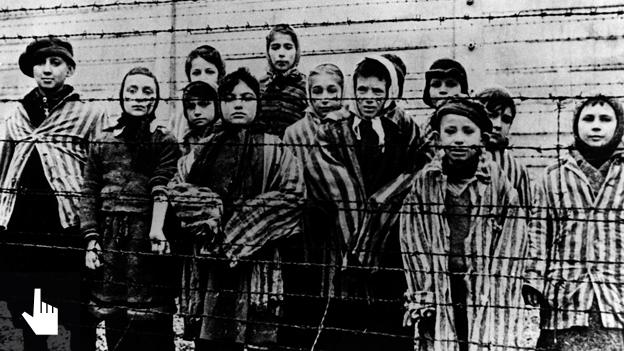Oskar Groening trial: Loss of family I never knew
- Published
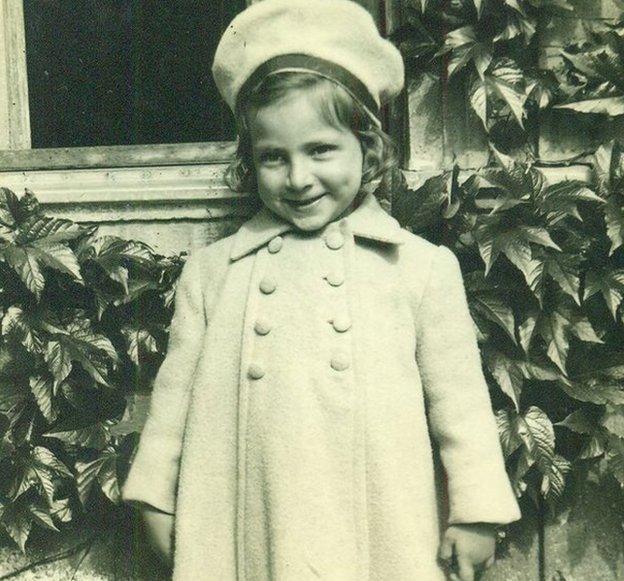
Judith Kalman was given the names of her half-sister, Eva (above), and her mother's niece Judit
Former SS officer Oskar Groening, known as the bookkeeper of Auschwitz, is being tried in the German city of Lueneburg for being an accessory to murder.
On Wednesday, co-plaintiff Judith Kalman from Canada gave the court an account of how her life had been affected by the deaths of her relatives, especially her half-sister, Eva Edit Weinberger, at Auschwitz in June 1944.
These are extracts from her testimony.

Hungarian family
The loss of my parents' loved ones, in particular the six-year-old half-sister Eva Edit I never knew, left me with a burden of inherited survivor guilt that has been a defining feature of my life.
It informed my choice of life partner and the trajectory of my professional endeavours.
Still, to address this court in the form of a victim impact statement, feels uncomfortably disproportionate.
If I am at all a victim, it is largely in a titular sense. The effects of the Holocaust on my life cannot be put on a par with how it changed my parents and all those who suffered its ravages. The loss to me of Eva Edit Weinberger is as nothing set against the devastation her death wrought on our father.
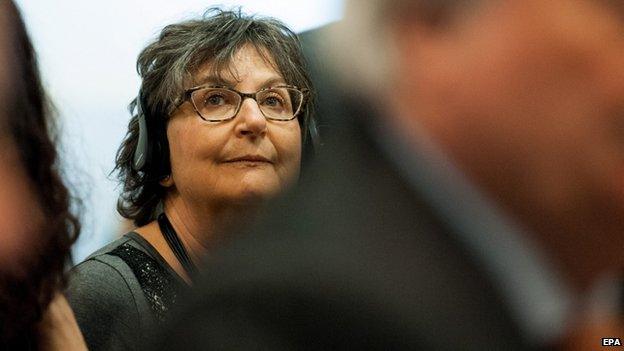
Judith Kalman, a co-plaintiff in the Groening trial, gave her testimony in court in Lueneburg
This father, hers and mine, was Gustav Weinberger Kalman.
His family came from the village of Vaja in north-eastern Hungary. They ran a large agricultural operation based primarily on the production of tobacco and the distilling of grain alcohol for export. My father and his two younger brothers, Ferenc and Pal, grew up to take over this family business.
When my father was called up for forced labour service in December 1940, he was almost 35, in charge of the finances and many of the administrative duties, and living in the nearby town of Nyiregyhaza where he had moved his young family.
He had married Mancika in 1937. Their daughter Eva Edit was born in April 1938.
My father escaped the sweep of Adolf Eichmann's net when the Jews of north-eastern Hungary were among the first to be deported to Auschwitz after the Germans occupied Hungary.
He was away in forced labour, as was his brother Ferenc.
Pal, home on leave, was deported with the rest of the family.
Ferenc, having survived the death march out of ghastly conditions in the copper mines in Bor, Serbia, died in the Flossenburg concentration camp on 9 November 1944, one day before my father was to arrive home at the family estate near Vaja.
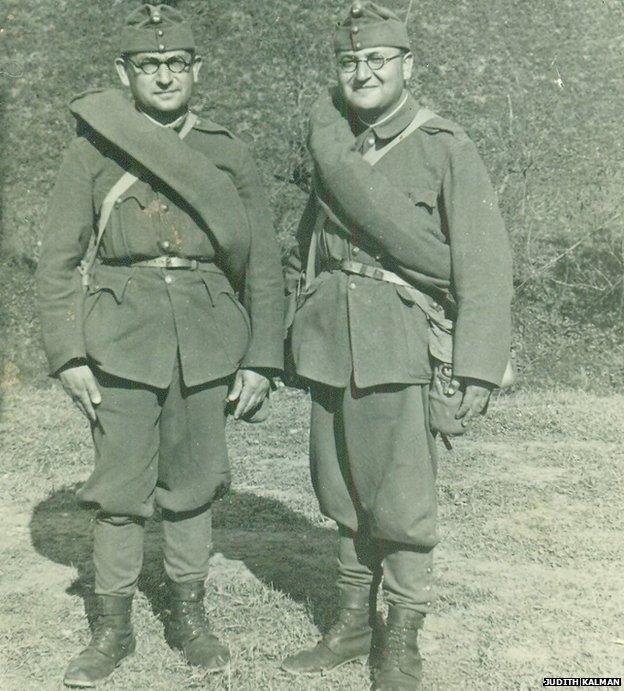
Judith's father Gustav (L) and his brother Ferenc were called up for forced labour in 1940
My mother, Anna Swarcz, survived Auschwitz, slave labour in munitions factories in Germany, and the long, forced march that led them through Buchenwald - which they again miraculously survived - and eventually towards Dresden.
Finally liberated by the Americans, she and her only surviving sister made a harrowing journey, mostly on foot, all the way back to Hungary.
Since no other family member had returned to her town of Beregszasz, my mother left.
She took with her nothing but the portrait of her favourite sister Magda, killed by Allied bombs at the munitions plant where the Jewish slaves had been turned out of the barracks so their guards could shelter within.
Having nowhere else to go, she set out for Nyiregyhaza, home to her husband, Marton.
She too had been married before the war, but only a brief, few weeks.
Marton had been called to labour service and sent to the Russian front. He was not to reappear until after my sister Elaine was born, when our parents Anna and Gustav already considered themselves husband and wife.

Gassed
The annihilation of my parents' families, in particular the deaths of the children, shaped me even from the point of conception.
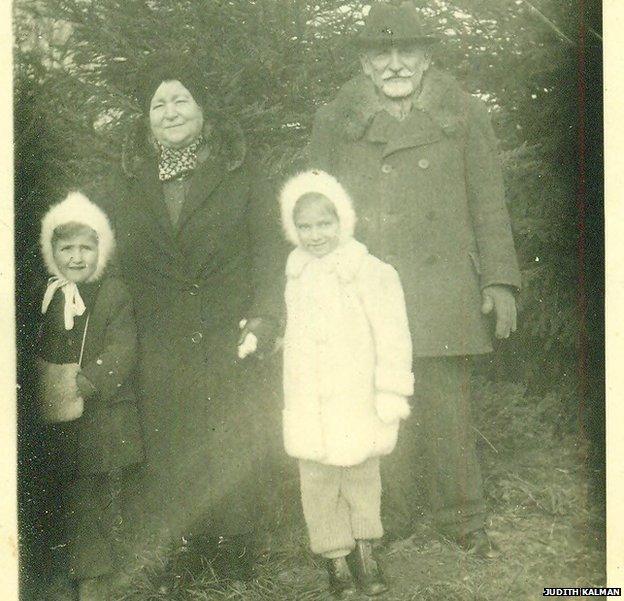
Gustav Weinberger's parents Ilona and Kalman Weinberger with Eva (R) and Marika (L) all died at Auschwitz
I had been called after two dead children: Eva after my father's daughter from his marriage to Mancika; and Judit after my mother's niece.
Both these children, Eva Edit Weinberger, aged six, and Judit Borenstein, 12, met their ends at Auschwitz. Not on the same day, but over the 57 days during which 430,000 Hungarian Jews were deported to the camp.
The two girls were among the 300,000 gassed, as were:
Eva's mother, Mancika Mandula Weinberger
My paternal grandparents, Kalman Weinberger and Ilona Weinberger
Their son Pal and his wife Meri, and their daughter Marika, 6
Twenty-two other family members died in that single transport
All told, my father lost close to 84 members of his 120 relatives.
My mother lost her parents, Samuel and Ilona Swarcz, her sisters Rozsa Swarcz Borenstein and Magda Swarcz, her niece Judit Borenstein, and her nephew Tibor Weisz, among numerous aunts, uncles, cousins and in-laws.

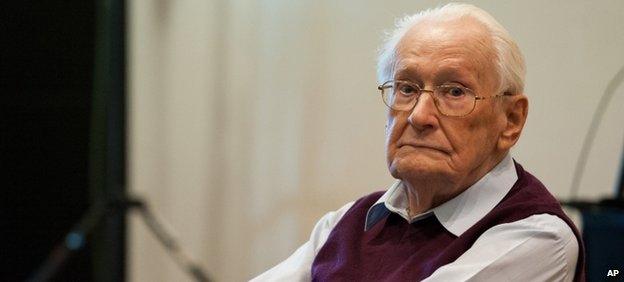

Leaving Hungary
My parents settled in Budapest after the war.
In 1956, at the time of the Hungarian Uprising, my father was 50, with a wife 13 years his junior, and two young children, my sister Elaine, 8, and me, Eva Judit, aged two.
The revolution persuaded my mother that we had to leave Hungary.
We moved to Montreal where my father lived and eventually died in 1990, leaving a wife, two daughters, and four grandchildren.
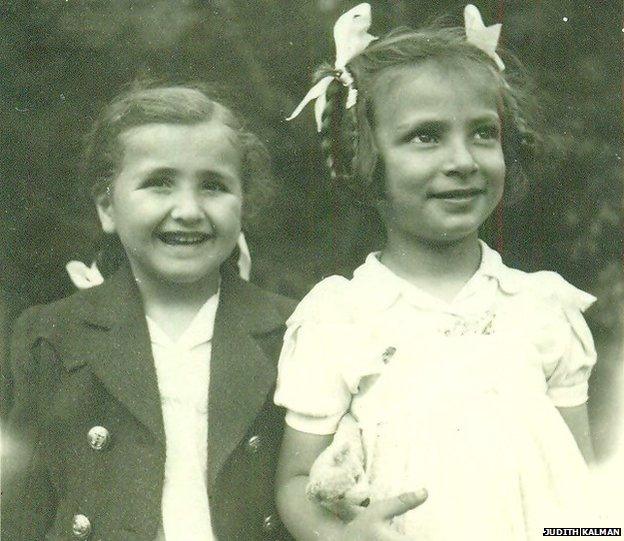
Eva's cousin Marika (L) was considered the prettier of the two

Life in Canada
Although I soon overtook Eva - we knew her as Evike - in age, I saw her as 16 years my senior, ever projected into the future to which she was entitled.
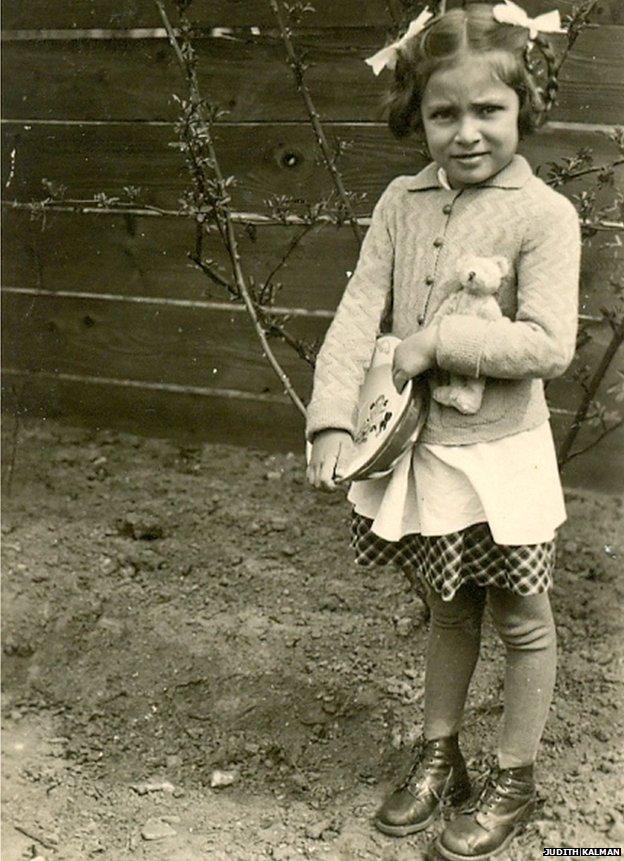
Eva Edit Weinberger, Judith's half-sister, was born in April 1938
As a child I formed a strange myth to explain the baffling circumstances of my existence.
Early on, through my father's stories and my mother's startling revelations of horror, I absorbed the knowledge that innocent children could be murdered and whole families and communities eradicated by forces beyond their control.
My sister Elaine was born in 1947.
Before she was six, my father had filled her head and heart with frequent narratives about his dead loved ones.
She could identify his photographs, reciting like a catechism the names of the dead. I cannot imagine how he was able to start a second family so soon upon losing everyone.
After two years in Canada, my mother took a college course to re-certify herself as a school teacher so that she might work for the public school system.
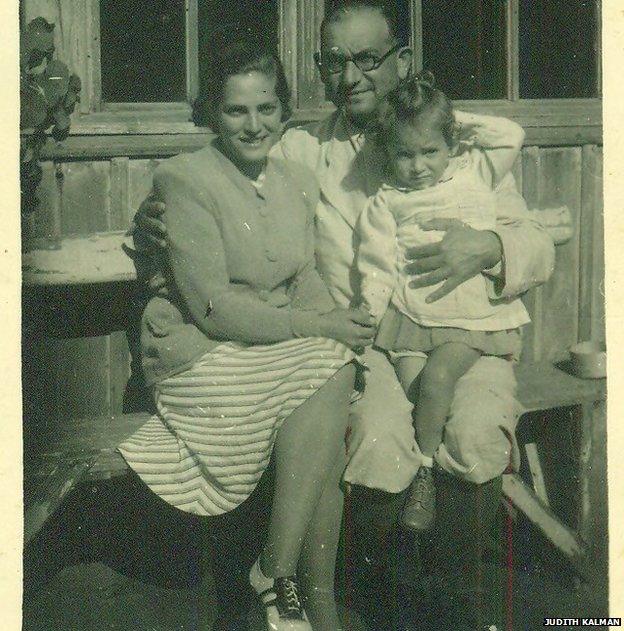
Gustav Weinberger(C) lost both his first wife Mancika as well as his daughter Eva at Auschwitz
My father could not bring himself to do the same in his field. He was too old, he said, by which he meant his real life was behind him.
The father of my childhood always claimed to be old, and it's true by comparison with the young, short-sleeved, cigarette-smelling fathers of my Canadian friends, he did look old.
My father dressed for a different time and place. He was often mistaken for my grandfather.
He mistrusted his new environment, always alert to danger.
He worried about snowstorms and daughters walking home from the bus stop after dark.
He didn't really believe it was safe to be Jewish anywhere.

Second-generation survivor guilt
Evike's death shaped my life so fundamentally, I wasn't to understand it until I was well into middle age and had experienced tragedy first-hand.
As far back as I can remember realising that I think most clearly with a pen in my hand, I intended to write the story of my father's family.
This at last would solve the riddle of my existence, why I was meant to be.
Through my words, his dead loved ones would once again come to life.
In fact, I've been able to write only the story of myself.
In May 2000, two months ahead of his 44th birthday, my husband took his life.
He had battled depression as long as I had known him, but in the last five years, the illness became unmanageable.
At the time I had sought the services of a psychotherapist for guidance about how to manage with a very sick partner and two children.
Following my husband's suicide, I tried to understand my marriage.
These explorations led me to my half-sister Evike, drawing connections to her role in my make-up that I had never before considered.
A child had died so that I might supplant her. How better to expiate such a debt than by saving someone who might otherwise not survive without me?
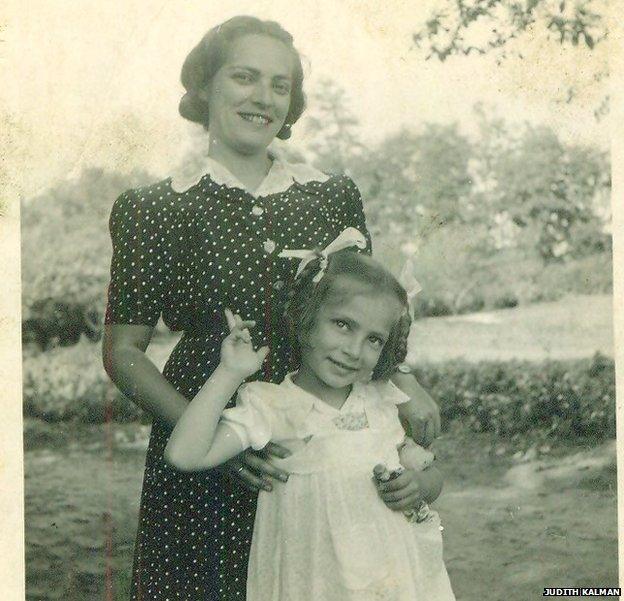
Eva and her mother Mancika were among the 430,000 Hungarians deported to Auschwitz
My husband was hardly more than a 17-year-old boy when we met, shortly after he ran away from his family.
I recognised him right away, one of the exceptional people, like the members of my father's family, who had been dealt a hand that was terminal.
Of course I couldn't know that my husband's hand would prove terminal as well. What I understood was that it was my fate to save him.
This was a role I never questioned, however it hemmed me in, consumed my mental and physical energies, and drew on my creative strengths. I was indebted, after all. I owed my life literally to the deaths of all the fine souls who had been unjustifiably murdered.
The least I could do was save this one who also deserved his chance at life.

Sole survivor
Mine is not the voice of a victim.
The last thing I would ever have imagined would be to use this voice to address a German court about the phantom child whose shadow preceded me through the years.
I cannot fully express how liberating it feels to have her acknowledged so publicly, and to be heard on behalf of my father and mother: little people who bore the enormous weight of history without solace of recognition.
- Published15 July 2015
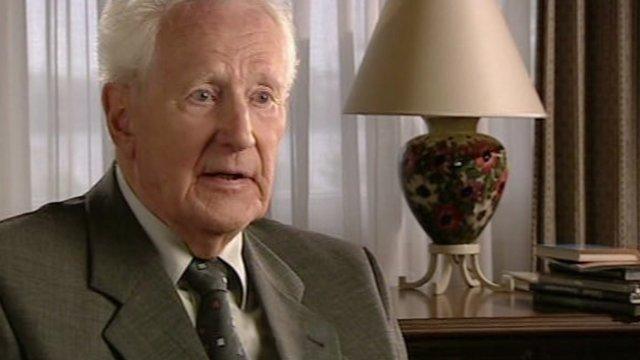
- Published21 April 2015
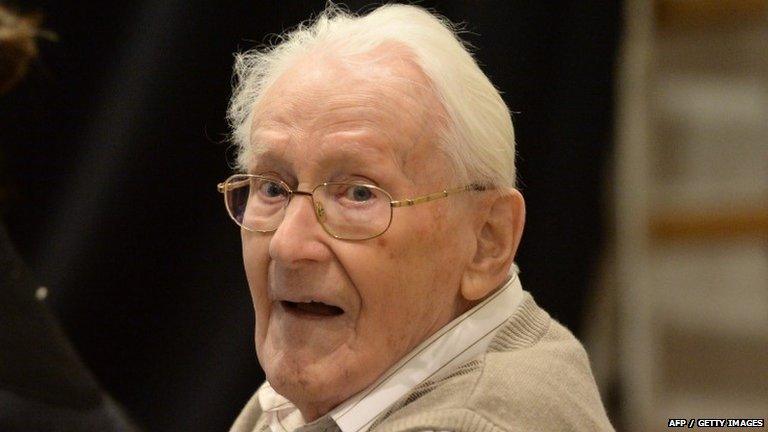
- Published22 April 2015
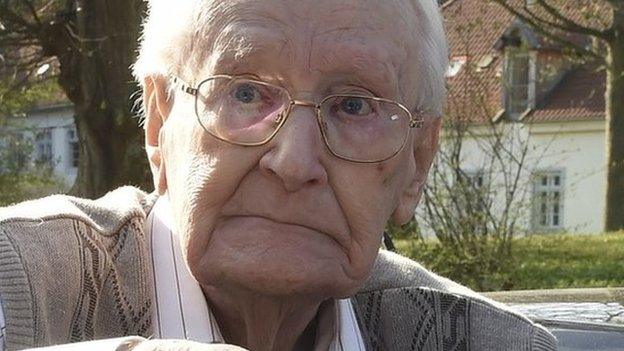
- Published27 January 2015
